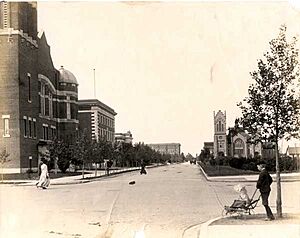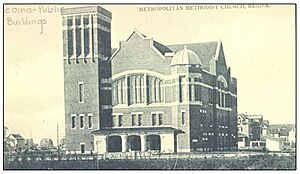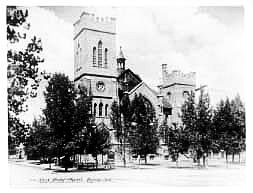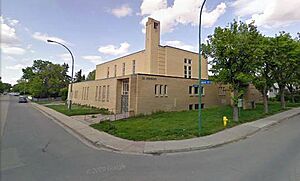Knox-Metropolitan United Church (Regina, Saskatchewan) facts for kids
Quick facts for kids Knox-Metropolitan United Church |
|
|---|---|
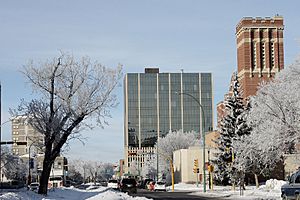
Victoria Avenue with Knox-Metropolitan United Church right
|
|
| 50°26′51″N 104°36′51″W / 50.4475°N 104.6143°W | |
| Location | 2340 Victoria Avenue Regina, Saskatchewan S4P 2M1 |
| Denomination | United Church of Canada |
| Architecture | |
| Functional status | Active |
| Architect(s) | Darling and Pearson |
| Groundbreaking | 1906 |
| Completed | 1907; 1914 |
| Construction cost | $100,000 first building |
Knox-Metropolitan United Church is a historic church in Regina, Canada. It stands downtown on Lorne Street, across from Victoria Park. This church brings together the history of two older church groups: the Presbyterians and the Methodists. Both groups started holding worship services in Regina way back in 1882.
Contents
Building the First Churches
The Knox Presbyterian church building was first located on 11th Avenue. Later, the congregation moved to a new spot at 12th Avenue and Lorne Street.
The Metropolitan Methodist Church was designed by a company called Darling and Pearson from Toronto. It cost more than $100,000 to build between 1906 and 1907. Both the Knox Presbyterian and Metropolitan Methodist churches were built in a square shape. This was different from many other churches, like Roman Catholic or Anglican ones, which were often long and narrow.
The 1912 Tornado and Rebuilding
A big tornado, known as the Regina Cyclone, hit Regina in 1912. Both the Knox Presbyterian and Metropolitan Methodist church buildings were destroyed by this powerful storm.
The church's website later shared this history: "Our building was once knocked down by the tornado of 1912, but we got back up again." Both churches were rebuilt quickly after the tornado. An architect named Francis Henry Portnall, who had helped build the Metropolitan Methodist Church, also worked on its new design after the tornado.
Church Union in 1925
On June 10, 1925, a new church group was formed in Canada called the United Church of Canada. This new group brought together Presbyterian, Methodist, and Congregational churches from across the country. Both Knox Presbyterian and Metropolitan Methodist churches became part of the United Church of Canada.
In 1927, Mr. and Mrs. Francis Nicholson Darke gave a special gift to the Metropolitan Church. They donated the Darke Memorial Chimes in memory of their son, Clifford Albert Darke. These twelve bells were made in London, England, by the same company that made bells for Westminster Abbey. The bells weigh almost sixteen tons in total. They can be played by several people at once or by a single person playing a melody.
Joining of Congregations
In 1951, the groups of people who went to the Knox and Metropolitan churches decided to join together. They became one big congregation, often called Knox-Met. The Knox church building was taken down, and the combined group started using the Metropolitan building.
Many members of the Knox congregation had moved to a new area of Regina called Lakeview. When the Knox United Church building was demolished, its large pipe organ was moved to the new Lakeview United Church. Today, the only visible sign of the 1912 tornado at Knox-Met is different-colored bricks on the north wall. These bricks show where the wall collapsed and was rebuilt. The church also has beautiful stained glass windows.
St. Andrew's Church
St. Andrew's Presbyterian was once a "daughter" church of Knox Presbyterian. This means it was started by people from Knox Presbyterian. It was located north of the railway tracks on Athol Street and Dewdney Avenue. The St. Andrew's congregation started even before Saskatchewan became a province in 1905.
A new building for St. Andrew's was built after World War II. This church had an electric organ, and its choir director for many years was Howard Leyton-Brown. He was the head of the music department at the University of Regina. Even though St. Andrew's was a lively church, its congregation became very small over time. Instead of closing down, the St. Andrew's congregation moved to Knox-Met. They now hold their Sunday services in a special chapel there.
Knox-Met Today
Knox-Metropolitan United Church is a popular place for many events in downtown Regina. It hosts choral concerts, organ recitals, and the yearly Rotary Carol Festival. The Rotary Club has sponsored this Christmas Carol Festival at Knox-Met since around 1940.
The church has a large, three-manual Casavant Frères pipe organ. This impressive organ was installed in 1974. The Darke Memorial Chimes are still heard every Sunday morning and on other special occasions.
The inside of Knox-Met is arranged in a special way called the Akron Plan. The seats are set up in a fan shape, spreading out from the pulpit and communion table. This design helps everyone in the congregation feel more connected during worship services.
Images for kids


